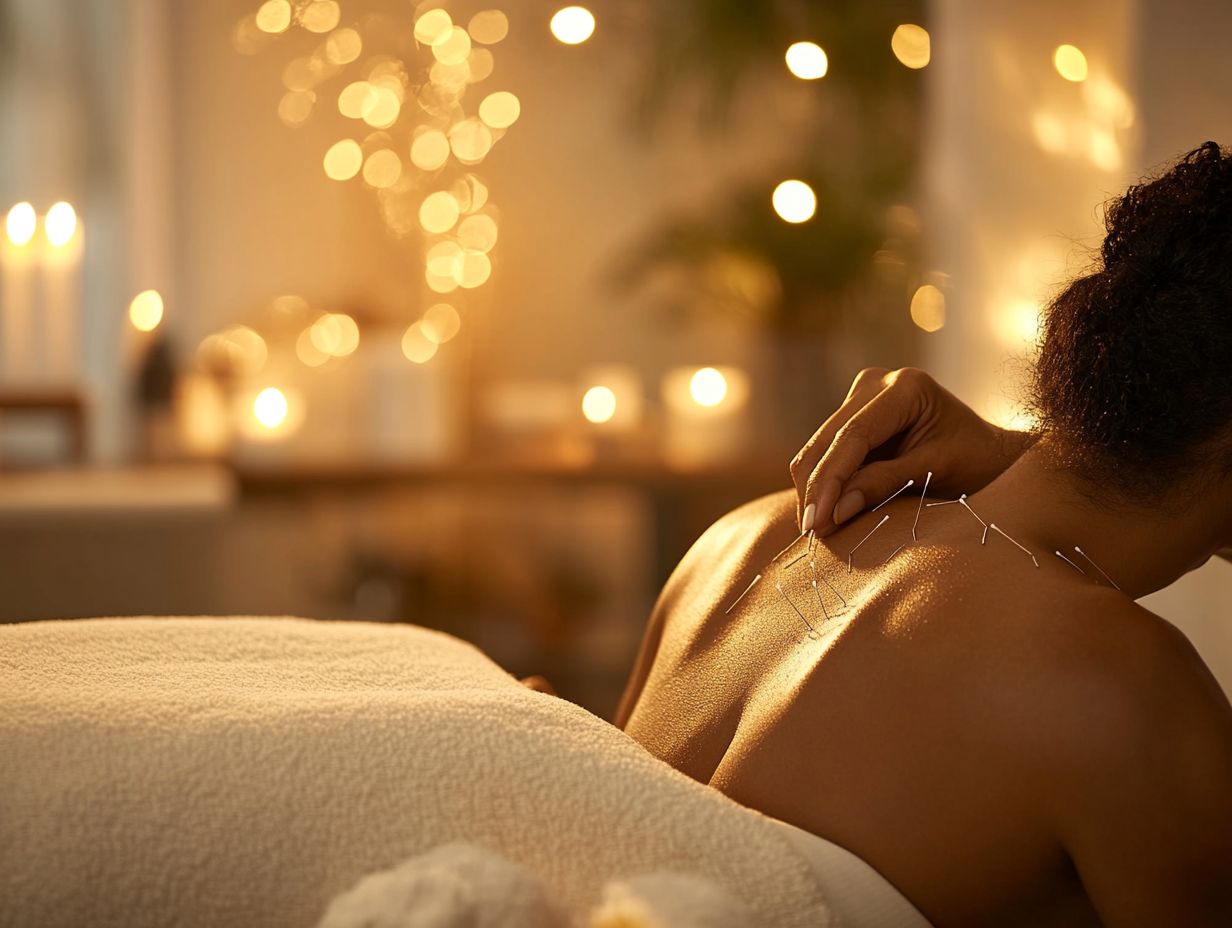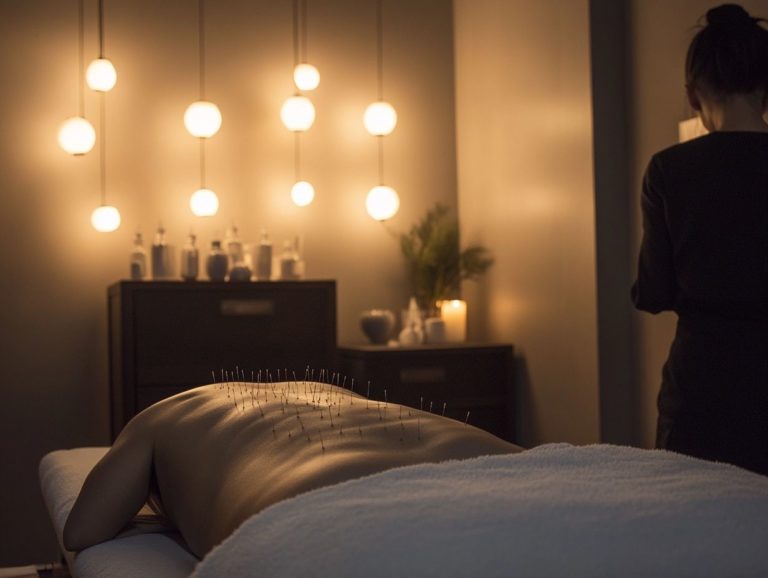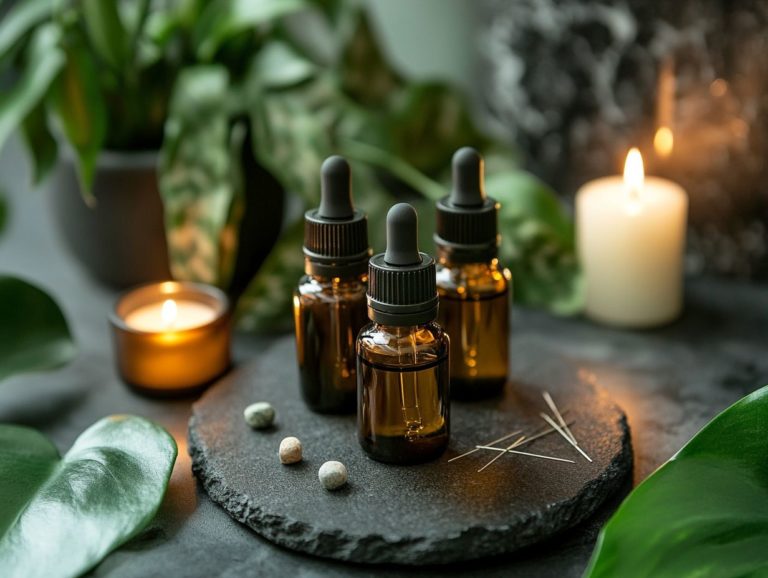How to Incorporate Acupuncture into Your Wellness Plan
Get ready to explore the fascinating world of acupuncture! This ancient practice has seamlessly integrated into contemporary wellness routines, presenting a holistic approach to health that resonates with many.
This article illuminates the rich history and cultural significance of acupuncture. It investigates the myriad of physical and mental health benefits it offers while providing you with insightful guidance on how to effectively weave it into your wellness plan.
From setting your expectations for each session to essential aftercare tips, you’ll be thoroughly prepared to embrace this transformative therapy with confidence and safety. Don’t wait to experience the transformative benefits of this incredible therapy!
Contents
- Key Takeaways:
- Understanding Acupuncture
- Benefits of Acupuncture
- Incorporating Acupuncture into Your Wellness Plan
- Preparing for an Acupuncture Session
- Aftercare and Follow-up
- Potential Risks and Safety Measures
- Preguntas Frecuentes
- 1. Qu es la acupuntura y c mo puede beneficiar mi plan de bienestar?
- 2. C mo encuentro un acupunturista calificado?
- 3. Con qu frecuencia debo recibir tratamientos de acupuntura?
- 4. Puede la acupuntura ayudar con condiciones de salud espec ficas?
- 5. La acupuntura est cubierta por el seguro?
- 6. Qu debo esperar durante una sesi n de acupuntura?
Key Takeaways:

- Incorporating acupuncture into your wellness plan can provide physical and mental health benefits.
- When considering acupuncture, consulting with a practitioner and combining it with other wellness practices can enhance its effectiveness.
- Preparing for a session and following aftercare tips can help you get the most out of your acupuncture treatment while staying safe.
Understanding Acupuncture
Acupuncture stands as a vital pillar of traditional Chinese medicine, highlighting the importance of balancing your body s energy flow, or qi (pronounced ‘chee’). This holistic approach is designed to tackle a range of health concerns, from chronic pain and digestive issues to mental health challenges.
Through tailored care plans, you ll find an integration of relaxation techniques, emotional healing, and effective pain management strategies. As you embark on this health journey, you’ll engage with community wellness practices and mindful routines, giving you the power to reach optimal physical and emotional well-being.
What is Acupuncture?
Acupuncture is a therapeutic practice that invites you to experience the insertion of fine needles into specific acupoints on your body. This stimulates the flow of energy, or qi, restoring balance within your body s energy pathways.
Rooted in Traditional Chinese Medicine, this ancient technique is based on the understanding that your body hosts an intricate network of energy pathways through which energy flows. By precisely targeting these acupoints, acupuncture fosters an optimal energetic balance while offering not just pain relief but also enhancing your overall wellness.
The process of needle insertion is believed to activate your body s self-healing mechanisms by influencing the nervous system, hormonal balance, and immune response. It can help alleviate various ailments from chronic pain and stress to digestive issues positioning acupuncture as an essential element of holistic health approaches.
History and Cultural Background
Acupuncture, with its deep roots in traditional Chinese medicine, has a history that spans thousands of years. It has evolved into a vital element of holistic healthcare practices across various cultures.
This ancient methodology draws from a rich tapestry of historical practices, placing great emphasis on achieving balance within the body and recognizing the significance of Qi, or life energy. Originating over 2,500 years ago, acupuncture has woven itself into the cultural and spiritual fabric of China, influencing many aspects of wellness and self-care.
Today, countless individuals worldwide are integrating acupuncture into their modern wellness routines, drawn by its remarkable ability to alleviate various ailments and enhance overall well-being. This practice underscores the importance of treating the body as an interconnected whole and serves as a profound reminder of the enduring wisdom embedded in traditional healing systems.
Benefits of Acupuncture
Acupuncture presents a wealth of health benefits. From effective pain management to stress relief and even emotional healing, this holistic approach serves as a versatile treatment option for a range of health concerns, making it an invaluable tool in your wellness journey.
Start your journey towards better health today with acupuncture!
Physical and Mental Health Benefits

Discover the amazing benefits of acupuncture! This ancient practice enhances both physical and mental health, offering effective stress relief and bolstering emotional wellness for those facing various health challenges.
Acupuncture taps into your body s innate healing capabilities by stimulating specific points. It promotes relaxation and alleviates tension in both your mind and body.
Regular sessions can lead to improved mood stability, empowering you to navigate the ups and downs of daily life with greater ease.
Acupuncture plays a crucial role in managing chronic pain, headaches, and digestive issues. It provides a holistic approach to overall well-being.
As more individuals seek natural alternatives for their health, acupuncture becomes a helpful option for your health.
Incorporating Acupuncture into Your Wellness Plan
Incorporating acupuncture into your wellness plan can significantly elevate your overall well-being. This practice promotes a state where your body feels neither too tired nor overly energized and aligns seamlessly with holistic lifestyle choices that cater to your unique health needs.
Embracing acupuncture is not just about treatment; it’s about nurturing a more harmonious and vibrant you.
Consulting with a Practitioner
Consulting with a qualified acupuncture practitioner is crucial for crafting a treatment plan that meets your specific health concerns and wellness goals. The practitioner’s expertise plays a vital role in performing a detailed assessment.
They consider not just your physical symptoms but also emotional and lifestyle factors that may affect your well-being. This thorough evaluation enables them to recommend targeted acupuncture techniques that address imbalances within your body.
A personalized approach ensures that your treatment is far from generic; it s finely calibrated to help you achieve optimal wellness.
Through open communication, the practitioner adapts the plan as needed, creating a collaborative partnership that empowers you on your health journey.
Combining with Other Wellness Practices
Combining acupuncture with other wellness practices such as herbal medicine, physical activity, and relaxation techniques can enhance your health outcomes significantly. This integrative approach paves a holistic pathway to wellness.
It fosters balance in both your mind and body. When you pair acupuncture with herbal remedies, you may experience deeper relief from ailments, as the herbs complement the energy shifts initiated by the needle therapy.
Incorporating regular physical activity amplifies the benefits of these methods, boosts circulation, and fosters a sense of vitality.
Employing relaxation techniques like meditation or controlled breathing creates a soothing effect that further alleviates stress and anxiety. This establishes a cycle of healing and well-being that enriches your overall experience.
Preparing for an Acupuncture Session
Preparing for an acupuncture session means familiarizing yourself with what lies ahead, including the needle insertion process. Understanding these elements will ease any apprehension and allow you to fully embrace the treatment’s benefits.
What to Expect and How to Prepare

During an acupuncture session, anticipate a gentle needle insertion process complemented by relaxation techniques for a calming experience. As you settle onto a comfortable treatment table, the practitioner will discuss any specific concerns or health goals you may have.
Once you’re ready, they’ll carefully insert ultra-fine needles into precise points on your body, typically causing minimal discomfort. To enhance your relaxation, soothing music may play in the background while dim lighting creates a serene atmosphere.
You are encouraged to focus on your breath, allowing tension to dissipate as the practitioner expertly adjusts the needle placements. This nurturing environment promotes physical healing and fosters a profound sense of mental and emotional tranquility.
Aftercare and Follow-up
Aftercare and follow-up are essential components of your acupuncture journey. By prioritizing these elements, you can fully harness the health benefits and effectively monitor your progress through a wellness journal.
Tips for Post-Treatment Care
Effective post-treatment care can significantly enhance relaxation and support the ongoing wellness routines that are vital for your long-term health.
To truly maximize the benefits of your treatment, consider incorporating gentle activities like stretching or yoga. These practices will help keep your body limber and reduce any lingering tension.
Staying well-hydrated is equally important. Drinking plenty of water after your session aids in flushing out toxins and helps prevent dehydration.
Integrating calming practices like meditation or deep-breathing exercises can cultivate mental peace. A balanced diet rich in whole foods will also support your body s recovery process.
Make these smart lifestyle choices to boost your acupuncture benefits and create a harmonious environment that reinforces the positive effects of your treatment.
Potential Risks and Safety Measures
While acupuncture is largely safe, it’s essential to understand potential risks and take appropriate safety measures to ensure a positive treatment experience. This is particularly important when discussing any health concerns with your practitioner.
Understanding the Risks and How to Stay Safe
Recognizing the risks of acupuncture and adhering to safety measures can greatly enhance your treatment experience while ensuring your safety.
While acupuncture is generally safe when performed by a qualified practitioner, it’s important to acknowledge that certain risks do exist. Improper needle technique can lead to complications such as infections or bruising, and individuals with specific health conditions may face adverse reactions.
If you re considering this alternative therapy, consult a certified acupuncturist who understands your unique needs. By ensuring a clean environment, using sterile needles, and openly discussing any existing medical conditions or concerns, you can significantly minimize risks, creating a more secure and comfortable atmosphere for your treatment.
Preguntas Frecuentes

1. Qu es la acupuntura y c mo puede beneficiar mi plan de bienestar?
La acupuntura es una forma de medicina tradicional que implica insertar agujas finas en puntos espec ficos del cuerpo para estimular la curaci n y el equilibrio. Esta pr ctica puede ayudar a aliviar el estr s, el dolor y mejorar el bienestar general cuando se incorpora a un plan de bienestar.
2. C mo encuentro un acupunturista calificado?
Es importante investigar y encontrar un acupunturista con licencia y las credenciales adecuadas. Pregunta a tu m dico, amigos o familiares, o busca acupunturistas certificados en tu rea a trav s de organizaciones profesionales como la Comisi n Nacional de Certificaci n en Acupuntura y Medicina Oriental (NCCAOM).
3. Con qu frecuencia debo recibir tratamientos de acupuntura?
La frecuencia de los tratamientos depender de tus necesidades y objetivos individuales. Algunas personas pueden beneficiarse de sesiones semanales regulares, mientras que otras solo pueden necesitar tratamientos mensuales u ocasionales. Tu acupunturista trabajar contigo para crear un plan de tratamiento personalizado.
4. Puede la acupuntura ayudar con condiciones de salud espec ficas?
Se sabe que la acupuntura ayuda con una variedad de condiciones de salud. Es importante consultar a tu m dico antes de incorporarla a tu plan de bienestar. La acupuntura puede utilizarse como terapia complementaria para condiciones como el dolor cr nico, alergias, ansiedad y m s.
5. La acupuntura est cubierta por el seguro?
Algunos planes de seguro pueden cubrir tratamientos de acupuntura, pero es mejor consultar con tu proveedor de seguros de antemano. Pregunta a tu acupunturista sobre la cobertura del seguro y si ofrecen alg n plan de pago o tarifas escalonadas.
Ready to start your wellness journey? Find a qualified acupuncturist today!
6. Qu debo esperar durante una sesi n de acupuntura?
Durante una sesi n de acupuntura, te acostar s en una mesa c moda. Un terapeuta de acupuntura insertar agujas finas en puntos espec ficos de tu cuerpo.
Estas agujas se dejan en su lugar durante 15 a 30 minutos. Mientras tanto, podr s relajarte y disfrutar de la experiencia. Es normal sentir un leve hormigueo en el sitio de la aguja, pero la mayor a de las personas encuentra que la acupuntura es indolora y muy relajante.






